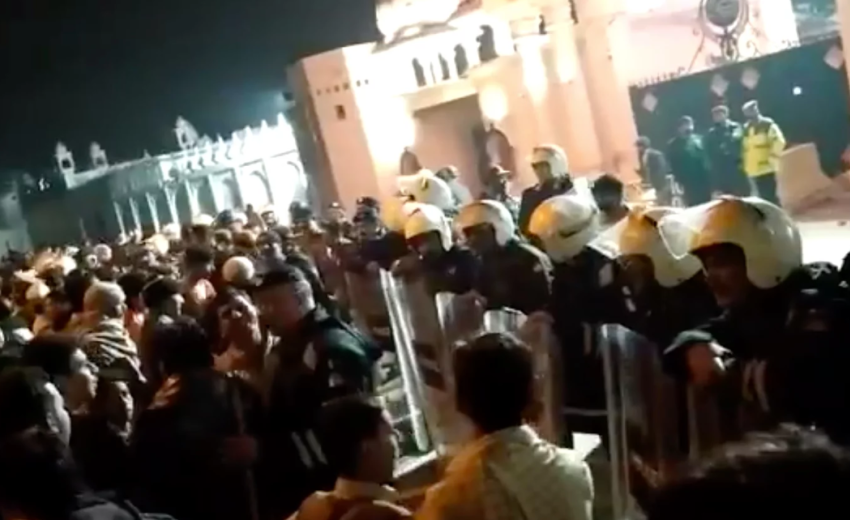(RNS) – Hundreds of Muslims have mobbed a prominent Sikh gurdwara in Pakistan after months of tension over a Sikh woman's alleged forced conversion to Islam.
According to media reports emerging from the region Friday (Jan. 3), several Sikh devotees were stranded for hours inside the Nankana Sahib, the pilgrimage site in Pakistan’s Punjab Province where Sikhism’s founder, Guru Nanak, was born in the 15th century.
Muslim mobs pelted the gurdwara with stones and shouted that they would destroy the gurdwara and change its name to Ghulam-e-Mustafa, an Arabic term meaning the servant of the Prophet Muhammad, according to video posted on social media.
The mob has since dispersed, and the gurdwara has been re-opened after police arrived on the scene and began arresting protesters, journalist Ravinder Singh told Religion News Service.
The violence followed the celebration of Guru Gobind Singh Jayanti, a festival commemorating the birthday of the tenth Sikh guru, on Thursday.
Indian leaders have condemned the attacks and urged Pakistani officials to protect the country’s Sikh minorities as well as the sanctity of the historic gurdwara.
“India strongly condemns these wanton acts of destruction and desecration of the holy place,” the country’s Ministry of External Affairs said in a press statement. “We call upon the Government of Pakistan to take immediate steps to ensure the safety, security, and welfare of the members of the Sikh community. Strong action must be taken against the miscreants who indulged in desecration of the holy Gurudwara and attacked members of the minority Sikh community.”
The mob was incited by the alleged “forcible abduction and conversion” of a local Sikh woman, Jagjit Kaur, in late August, the statement said. Kaur is the daughter of a pathi, or priest, at another local gurdwara.
Local media reports say the mob was led by the family of Mohammad Hassan, a Muslim man who married Kaur. According to his family, the marriage and conversion were lawful and consensual, but authorities and local Sikhs have allegedly pressured Hassan to return Kaur to her family.
On Thursday, Hassan's home was raided, and members of his family were detained by police. Other family members began a protest march, demanding his family's release. What was initially a private family matter soon escalated into a raucous religious protest, said Harinder Singh, co-founder of the U.S.-based Sikh Research Institute.
"He went and appealed to people within the city of Nankana Sahib, basically saying, 'Look at what's happening in this Islamic Republic, the Muslims are not being protected,'" Harinder Singh, who has spoken to Sikhs at the gurdwara several times and urged Kaur's family to speak out after her conversion, told Religion News Service. "But then extreme clerics and friends of the family started giving serious threats... essentially saying there should be no sign left of this gurdwara or the Sikhs of the city."
Harinder Singh told the Religion News Service he knows of a handful of other local incidents of forced conversions of young Sikh women, most of which have gone unreported and some of which he argues involved long-term grooming rather than violence.
Either way, he said, the incidences have left Sikhs around Pakistan anxious for their future.
"The crux of the issue is these two things: One, why are these forceful marriages and conversions taking place?" he asked. "And secondly, what kind of protections need to be given to these historic shrines in Pakistan, so they're not destroyed by an emotional outburst like this?"
Sikh rights advocates say Pakistan's Sikh population has dropped dramatically since 2002, from an estimated 40,000 to 8,000, as forced conversions and violence against Sikhs have ramped up with little to no legal protections in place.
Indian politician Sukhbir Singh Badal, leader of the Akali Dal Party, pushed Prime Minister Narendra Modi to ask Pakistani Prime Minister Imran Khan for special security arrangements at the gurdwara, noting that the attack has legitimized Pakistani minorities’ long-standing fear for their communities’ safety.
"The most pious place, Nankana Sahib, has been attacked by the locals," he told Ravinder Singh in an interview. “What is the safety there now?... Protection should be given to the minorities."
Amarinder Singh, the chief minister of Punjab in India, has urged Khan “to immediately intervene to ensure that the devotees stranded in Gurdwara Nankana Sahib are rescued and the historic Gurdwara is saved from the angry mob surrounding it.”
While the majority of the world’s 20 million Sikhs live in neighboring India, Pakistan is home to some 70 historic gurdwaras commemorating Guru Nanak's life.
In November, the historic gurdwara was lit up to celebrate the 550th birth anniversary of Guru Nanak. Relations between Muslim-majority Pakistan and the international Sikh community were then at a historic high as India and Pakistan successfully negotiated an agreement to open the 2.5-mile Kartarpur Sahib Corridor, allowing Sikh pilgrims to travel between Sikh gurdwaras in the Indian and Pakistani sides of the Punjab region.
------------------
Editor's note:
~The incitor of the incident who called for radical actions towards Sikhs, Imran Ali Chisti, issued an apology on social media.
~Muslim leaders and political officials visited Nankana Sahib and committed to stand in solidarity with the Sikh community.
~The holder of the lineage of Hazrat Mia Mir (historic Sufi saint and ally of Guru's, especially Guru Arjun) also visited Nankana to express solidary with Sikhs.

